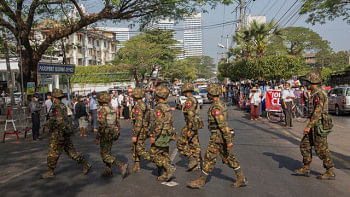Bangladeshi experts criticise UN report
Bangladeshi experts and officials have criticised the UN's High-Level Panel's report on the Post-2015 Development Agenda as it failed to address several of Bangladesh's as well as other least developed countries' vital issues including climate change, poverty and equitable growth.
Taking part in a panel discussion on the HLP report at the British High Commissioner's residence in Baridhara yesterday, they said the issues of climate financing, adaptation, and technology transfer are not addressed properly in the report.
They said the UN panel had set ambitious goals but it failed to reflect qualitative changes from MDG-1, and also added that there was a lack of vision on how the post-MDG 2015-2030 development agendas would be implemented.
Presided over by DFID Country representative Sarah Cooke, the discussion was addressed, among others, by British High Commissioner Robert Gibson, UN Resident Coordinator Neal Walker, CPD Chairman Prof Rehman Sobhan, Planning Commission member Shamsul Alam, Director General at the Foreign Ministry Riaz Hamidullah and DFID official Laurie Thompson.
Prof Rehman Sobhan said the report did not address the more substantive issue of lack of land which was increasing in South Asia or land poverty which was exponentially increasing in most countries.
He said the panel's goals did not address at all the inequitable working of market forces for small producers and workers or service providers located at the bottom of the value chain.
Neal Walker highlighted the consultative process of the HLP report and said Bangladesh, in terms of population, was the most important country among the LDCs.
Lauding Bangladesh's achievement in various sectors, he said Bangladesh was not only the model of LDC but it had the capacity to deliver and capacity to contribute in global debate.

 For all latest news, follow The Daily Star's Google News channel.
For all latest news, follow The Daily Star's Google News channel. 



Comments